Bhanu Kapil
Bhanu Kapil

Incubation: a space for monsters
New edition of this long out of-print classic of diasporic literature, featuring a forward by Eunsong Kim, an afterword by Emgee Dufresne, and new endnotes by Bhanu Kapil.
Incubation: a space for monsters is a formally innovative, hybrid-genre book that incorporates poetry and prose. Set in a shifting narrative environment, where human bodies, characters, and text are neither one thing nor another, this fragmentary-diaristic text journeys through the spaces in-between. Originally published in America in 2006 by Leon Works, and out of print for the last seven years, this is the first time this seminal text has been available in the UK.
Following protagonist Laloo – Cyborg, girl, mother, child, immigrant, settler – on a roadtrip through American landscapes, genre styles, and form, Incubation creates radical space for what is ‘monstrous’. Appropriating iconic American tropes, and the structure of Jack Kerouac’s On the Road, Incubation explores the challenges faced by immigrants in attaining such notions of freedom in so hostile an environment. In this fragmentary document there is a celebration in the cobbling together of lives; global in scope, with an intimate focus on interior voice, this landmark text evidences the early innovations and talents of this T.S. Eliot prizewinning author.
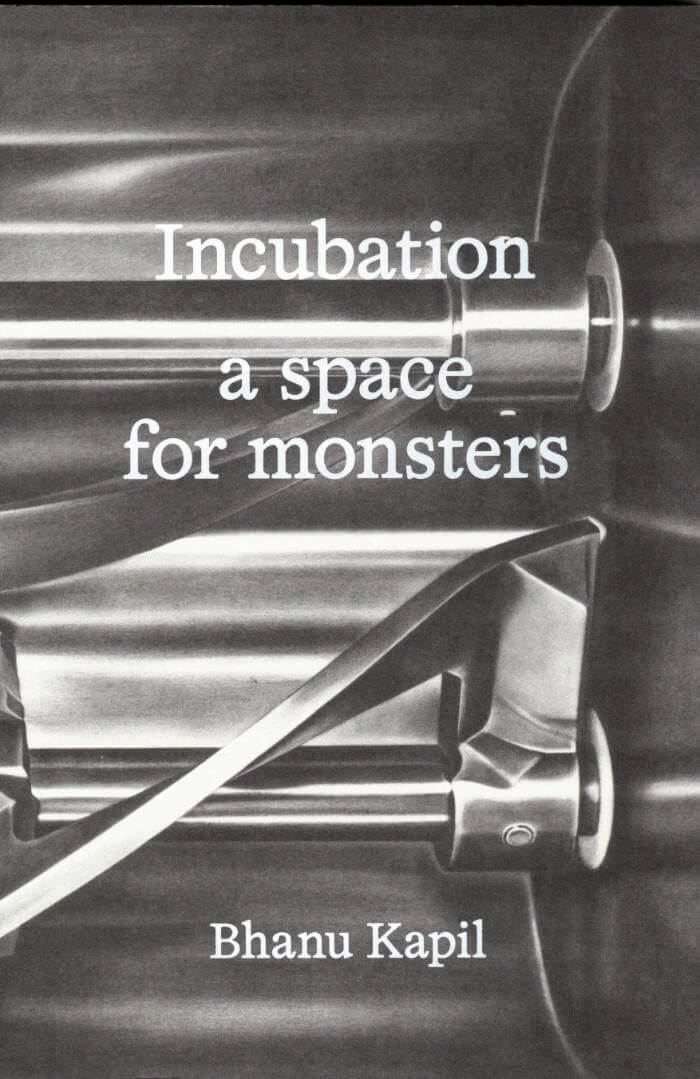
Incubation: a space for monsters
Incubation: a space for monsters is a formally innovative, hybrid-genre book that incorporates poetry and prose. Set in a shifting narrative environment, where human bodies, characters, and text are neither one thing nor another, this fragmentary-diaristic text journeys through the spaces in-between. Originally published in America in 2006 by Leon Works, and out of print for the last seven years, this is the first time this seminal text has been available in the UK.
Following protagonist Laloo – Cyborg, girl, mother, child, immigrant, settler – on a roadtrip through American landscapes, genre styles, and form, Incubation creates radical space for what is ‘monstrous’. Appropriating iconic American tropes, and the structure of Jack Kerouac’s On the Road, Incubation explores the challenges faced by immigrants in attaining such notions of freedom in so hostile an environment. In this fragmentary document there is a celebration in the cobbling together of lives; global in scope, with an intimate focus on interior voice, this landmark text evidences the early innovations and talents of this T.S. Eliot prizewinning author.

How To Wash A Heart
How To Wash A Heart, Kapil's first full-length collection published in the U.K., depicts the complex relations that emerge between an immigrant guest and a citizen host. Drawn from a first performance at the ICA in London in 2019, and using poetry as a mode of interrogation that is both rigorous, compassionate, surreal, comic, painful and tender, by turn, Kapil begins to ask difficult and urgent questions about the limits of inclusion, hospitality and care.
Winner of the T.S. Eliot Prize 2020.
Poetry Book Society Choice for Summer 2020.
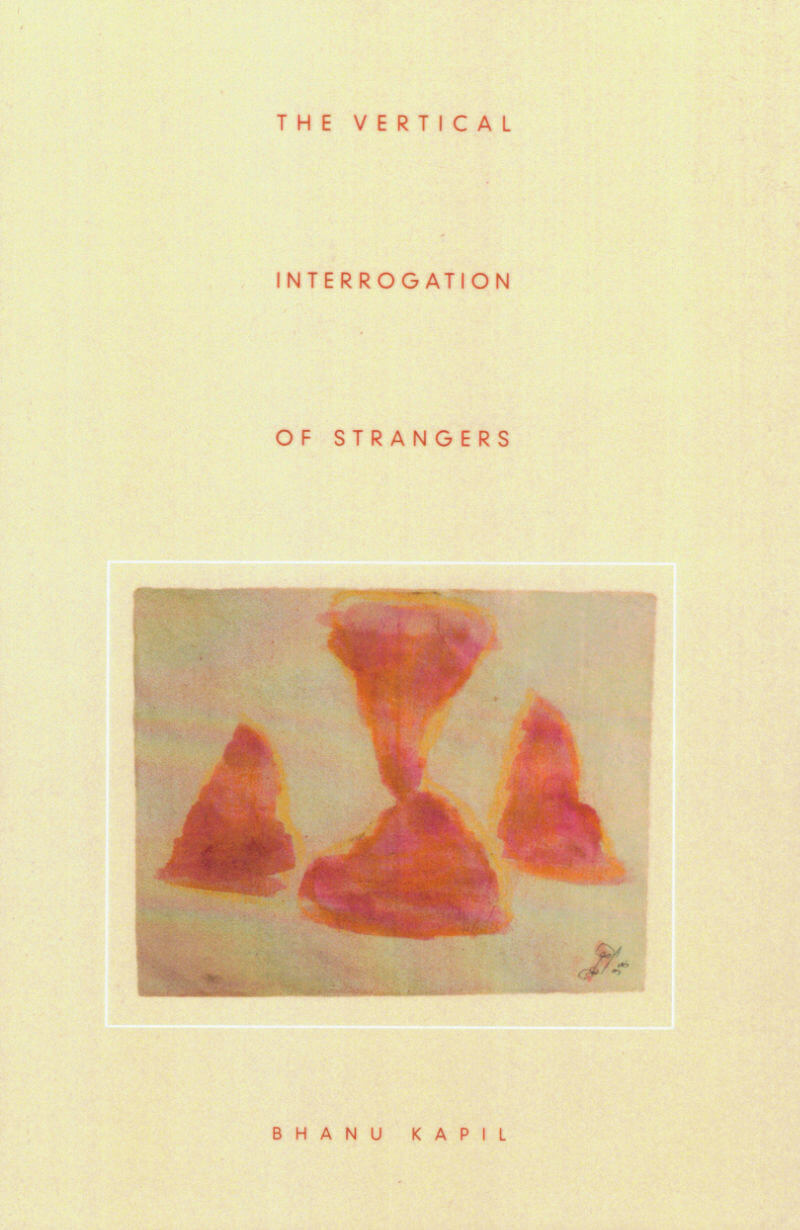
The Vertical Interrogation of Strangers
The Vertical Interrogation of Strangers blends the narratives of the travelog and the coming of age novel. It is written by a young Indian woman whose travels take her between homes in two countries, India and England, and through parts of the United States. These short pieces reveal new ways of belonging in the world and possibilities for an art grounded in a localized cosmopolitan culture.
Bhanu Kapil has written three full-length prose/poetry works, THE VERTICAL INTERROGATION OF STRANGERS (Kelsey Street Press, 2001), INCUBATION: A SPACE FOR MONSTERS (Leon Works, 2006), and HUMANIMAL [A PROJECT FOR FUTURE CHILDREN] (Kelsey Street Press, 2009). Born in the UK to Indian parents, Bhanu lives in Colorado, where she teaches in The Jack Kerouac School of Disembodied Poetics at Naropa University.
Published 2001
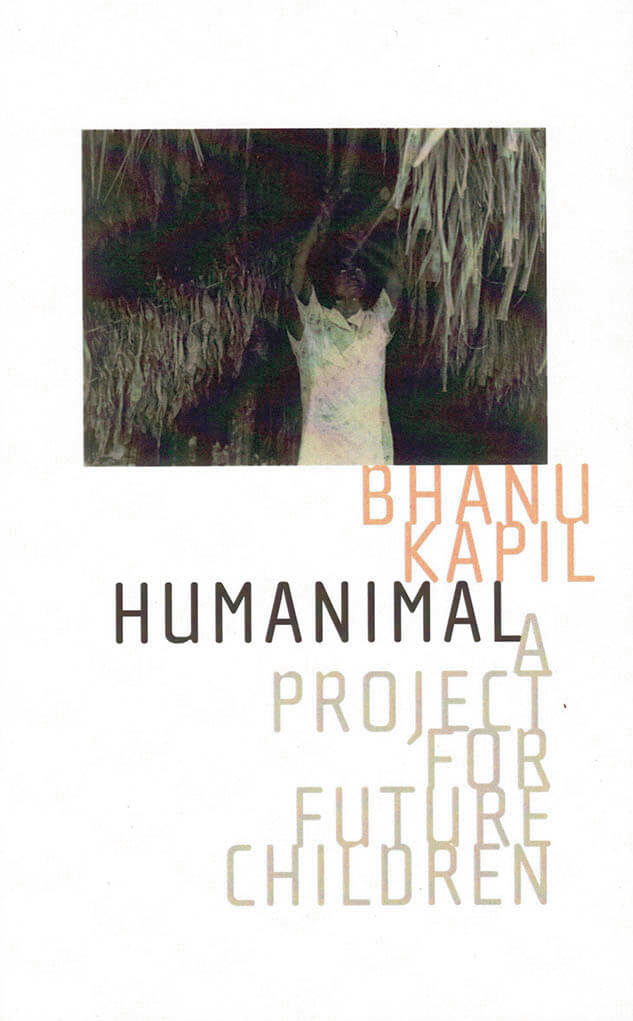
Humanimal: A Project For Future Children
In this prose document, Bhanu Kapil follows a film crew to the Bengal jungle to re-encounter the true account of two girls found living with wolves in 1921. Taking as its source text the diary of the missionary who strove to rehabilitate these orphans, through language instruction and forcible correction of supinated limbs, Humanimal functions as a healing mutation for three bodies and a companion poiesis for future physiologies.
Through wolfgirls Kamala and Amala, there is a grafting: what scars down into the feral opens out also into the fierce, into a remembrance of Kapil's father. The humanimal text becomes one in which personal and postcolonial histories cross a wilderness to form supported metabiology.
"Lucidly, holographically, your heart pulsed in the air next to your body; then my eyes clicked the photo into place. Future child, in the time you lived in, your arms always itched and flaked. To write this, the memoir of your body, I slip my arms into the sleeves of your shirt. I slip my arms into yours, to become four-limbed."
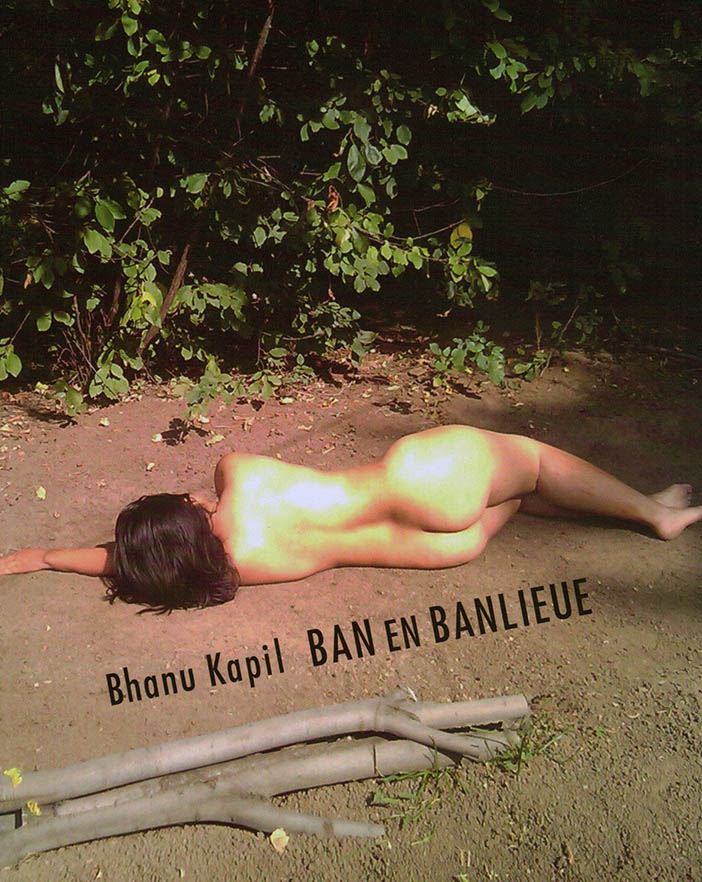
Ban En Banlieue
Bhanu Kapil's 'Ban en Banlieue' follows a brown (black) girl as she walks home from school in the first moments of a riot. An April night in London, in 1979, is the axis of this startling work of overlapping arcs and varying approaches. By the end of the night, Ban moves into an incarnate and untethered presence, becoming all matter - soot, meat, diesel oil and force - as she loops the city with the energy of global weather. Derived from performances in India, England and throughout the U.S., 'Ban en Banlieue' is written at the limit of somatic and civic aims.
And more
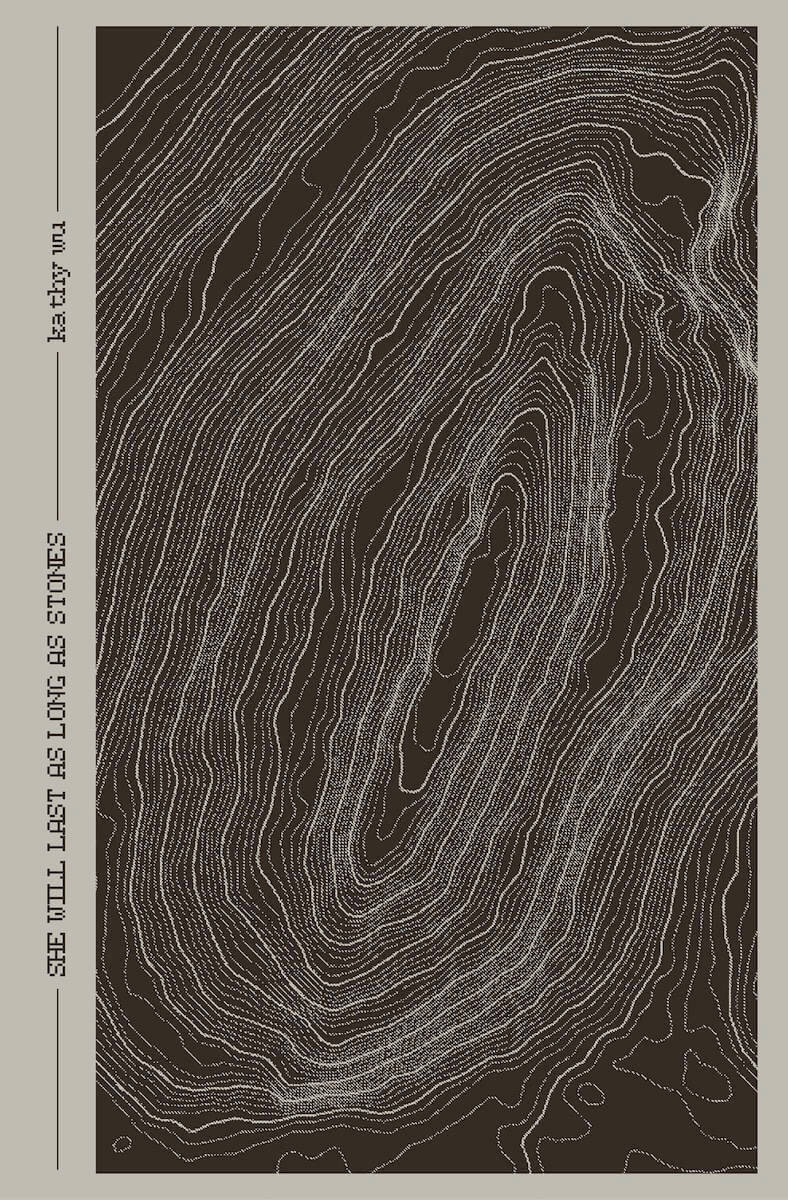
She Will Last as Long as Stones
Weaving together the matter of geology, migration, and computation, kathy wu’s debut book She Will Last as Long as Stones mines data from the United States Geological Survey, pairing it with (mis)translations of conversations with the author’s mother, narratives of racialized and gendered labor, and elegies on end-of-life care. Through text, photo-collage, and diagrammatic circuitry, wu mobilizes language toward the edges of things, where glitch and failure meet grief, outpour.
kathy wu's She Will Last as Long as Stones is the 2024 Open Reading Period Book Prize winner, and was selected by guest judge Bhanu Kapil.
kathy wu is a Chinese–American artist, poet, and designer living in Providence, Rhode Island, on Narragansett land. She works across digital media, fiber, book arts, and language to pull at histories of science and technology. Her work has appeared via The New School, Dialogist, Rain Taxi, NatBrut, and Tilted House, and has been anthologized by Fonograf Editions and Nightboat Books. She has been awarded fine arts residencies at Blue Mountain Center, Black Mountain College Museum, and Pao Arts Center. She currently teaches full-time at Rhode Island School of Design (RISD), and holds an MFA from Brown University’s Literary Arts program.
She Will Last as Long as Stones has the inter-genre brilliance of asking where materials originate, and following that question until writing becomes a kind of listening with stone, with metal, for magnetic reverberations, for the thinking at the back of the cave.
— Bhanu Kapil
There just might be currents coursing through landscape, language, software, and labor—presences that escape extraction and will not be denied. She Will Last as Long as Stones looks into the multiple temporalities and operations of many things: material place, mining, social and scientific documentation, computation, migrant women's work, and mother-daughter relations, constellating them into a poetics of wondrous design and resonant beauty.
— Kimberly Alidio
She Will Last as Long as Stones is a subtle circuit that conducts a charge but (paradoxically) remains open. wu's intricate parataxis offers readers fertile resistance, while simultaneously leading us to grounded revelations about the intertwined materialities of technology, language, and memory.
— Allison Parrish
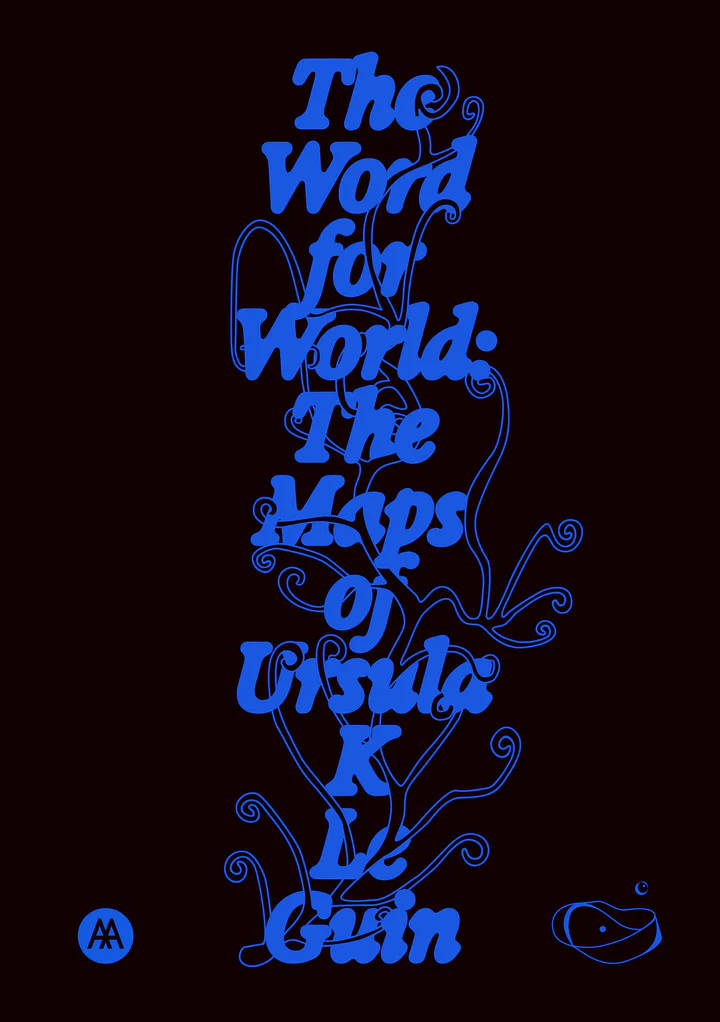
The Word for World: The Maps of Ursula K. Le Guin
When Ursula K. Le Guin started writing a new story, she would begin by drawing a map. The Word for World presents a selection of these images by the celebrated author, many of which have never been published before, to consider how her imaginary worlds enable us to re-envision our own.
Le Guin’s maps offer journeys of consciousness beyond conventional cartography, from the Rorschach-like archipelagos of Earthsea to the talismanic maps of Always Coming Home. Rather than remaining within known terrain, they open up paradigms of knowledge, exemplified by the map’s edges and how a map is read, made and re-made, together. The Word for World brings her maps together with poems, stories, interviews, recipes and essays by contributors from a variety of perspectives to enquire into the relationship between worlds and how they are represented and imagined.
Contributors: Federico Campagna, Theo Downes-Le Guin, Daniel Heath Justice, Bhanu Kapil, Canisia Lubrin, Una McCormack, David Naimon, Nisha Ramayya, Shoshone Collective, Standard Deviation, Marilyn Strathern.
Co-published by Spiral House and AA Publications to coincide with an exhibition of Ursula K. Le Guin’s maps at the Architectural Association, London, opening on 10 October 2025.
”One of the literary greats of the 20th century.” Margaret Atwood
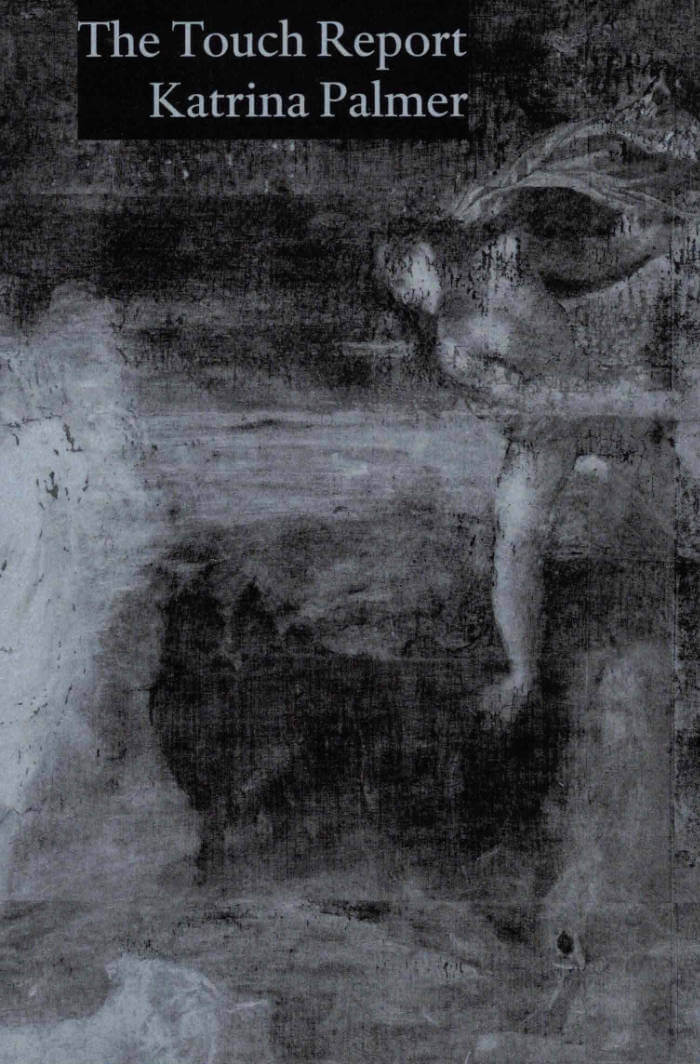
The Touch Report
‘Katrina Palmer’s The Touch Report asks a question that remains in motion for the duration of this extraordinary book. What is here? What’s still here? Here, Palmer writes an account of subjugation that is gestural, an on-going sequence of expulsions and punctures… Is there a kind of writing so transient it’s barely there? In Palmer’s writing, we encounter an ethics of presence and form that is deeply moving, completely and unbearably real.’ — Bhanu Kapil, author of How To Wash A Heart
An artist is invited to take up residency in a gallery filled with historical paintings. They are meticulously crafted, maintained, and revered. She begins to make an audit of the paintings, outlining the depictions of violence, subjugation and physical tension on public display. Eleven arrows in a torso, someone’s hair cut as they sleep, a man nailed to a cross. Horses, decapitations, memorable lobsters.
Written in sparse, urgent fragments that invite closer reading, The Touch Report, turns the reader’s gaze into the dark, to question our notions of ‘civilisation’.
Want to see something real, says the artist as she creeps through the darkness, keeping a log.
Katrina Palmer was commissioned by the National Gallery, London, as part of the 2024 National Gallery Artist in Residence Programme in collaboration with the Contemporary Art Society, generously supported by Anna Yang and Joseph Schull. This book is published as a result of research made during this residency.

Spells: 21st Century Occult Poetry
Spells are poems; poetry is spelling.
Spell-poems take us into a realm where words can influence the universe.
Spells brings together over forty contemporary voices exploring the territory where justice, selfhood and the imagination meet the transformative power of the occult. These poems unmake the world around them, so that it might be remade anew.
Kaveh Akbar, Rachael Allen, Nuar Alsadir, Khairani Barokka, Emily Berry, A.K. Blakemore, Jen Calleja, Anthony V. Capildeo, Elinor Cleghorn, CAConrad, Nia Davies, Paige Emery, Livia Franchini, Alexis Pauline Gumbs, Will Harris, Caspar Heinemann, Lucy Ives, Rebecca May Johnson, Bhanu Kapil, Amy Key, Daisy Lafarge, Dorothea Lasky, Francesca Lisette, Canisia Lubrin, Karen McCarthy Woolf, Lucy Mercer, Hoa Nguyen, Precious Okoyomon, Rebecca Perry, Nat Raha, Nisha Ramayya, Ariana Reines, Sophie Robinson, Erica Scourti, Sarah Shin, Himali Singh Soin, Tai Shani, Rebecca Tamás, Bones Tan Jones, Dolly Turing, Jane Yeh, Flora Yin Wong
Introduced by So Mayer
Afterword by Sarah Shin

Appendix Project
Written in the course of the year following the publication of Book of Mutter, and inspired by the lectures of Roland Barthes, Anne Carson, and Jorge Luis Borges, Appendix Project collects eleven talks and essays. These surprising and moving performances, underscored by the sleeplessness of the first year of their child’s life, contain their dazzling thinking through the work of On Kawara, Roland Barthes, W.G. Sebald, Bhanu Kapil, Walter Benjamin, Theresa Hak Kyung Cha, Marguerite Duras, Marlene Dumas, Louise Bourgeois, Doris Salcedo, Jenny Holzer, and more.

How to Leave the World
Everyone is asking about his identity. Gay? Muslim? French? Moroccan? Instead of choosing a side, he writes a book. A book about the forest and the city, Paris and Tangiers, shame and forgiveness, dating apps and spiritual discovery. A book about growing up as a diaspora kid in rural France, with desires that want to emerge at any cost. Told in mesmerising prose, How to Leave the World is a beautiful non-answer.
A rare book that depicts the isolation and poetry of rural life. — Annie Ernaux
What it takes to imagine social and physical freedom is what it meant to keep reading this incredible book. — Bhanu Kapil
Marouane Bakhti is a writer and arts journalist. Born in Nantes, France to a Moroccan father and a French mother, he studied history and journalism at the Sorbonne. He writes criticism for Mouvement magazine and lives in Paris. How to Leave the World is his first novel.
Lara Vergnaud is a literary translator of French and has translated over a dozen novels, including works by Zahia Rahmani, Fatima Daas, Mohamed Leftah and Mohamed Mbougar Sarr. Lara was born in Tunisia, grew up in the United States and currently lives in southern France.
978-1-7395161-3-0
21.6 x 13.9 cm
112 pp, paperback
September 2024

Klima #06
Antonine Scali Ringwald, Alicia Reymond and 1 more
The sixth issue of the transversal journal, at the crossroads of art and thought, political philosophy, gender studies and academic knowledge, delves into the various forms of mutation that ripple through our world.
In biology, a mutation describes an alteration of the genetic code that spurs change in a given organism. In linguistics, it generally triggers a modification of the structure of a word, often influenced by phonetic or morphological factors. In any case, mutations—steered by some ever-changing principle—always elude the spatio-theoretical framework which they are rooted in.
Therefore, the mutations composing this issue are different from those that preceded them, and still unlike the ones that will arise in the years to come. Mutabilities explores mutations operating in various fields of research that are precious to Klima—such as ecology, contemporary art, social sciences and politics, technology, or even language. Co-edited with curator Alicia Reymond, and in collaboration with graphic design studio Espace Ness, this new issue originates from an ongoing transformation process. Mirroring an exquisite corpse, Mutabilities unveils the interventions of contributors who position forms of radical mutation at the core of their own practice. The mutations driving them not only constitute subjects for theoretical analysis, but are actually the result, the consequence, and/or the fruit of embodied reflexions. What is a mutating practice?
Edited by Loucia Carlier, Alicia Reymond, Antonine Scali Ringwald.
Contributions by Karen Barad, Léa Bouton, Patrick Chamoiseau, Emma Bigé, Salomé Burstein, David Douard, Rita Elhajj, Kim Farkas, Gözde Filinta, Eva S. Hayward, Tishan Hsu, Bhanu Kapil, Veit Laurent Kurz, Yein Lee, Lionel Manga, P. staff, Diamond Stingily, Sabrina Röthlisberger Belkacem, The School of Mutants, Sarah Shin, Olivier Zeitoun, Joanna Zylinska.
Klima is an annual magazine dedicated to contemporary creation and academic research. It aims to democratize the academic world through a conversation with the world of contemporary artistic creation. Klima gives a voice to creative, singular and conscious individuals, by relating art, activism and academia.
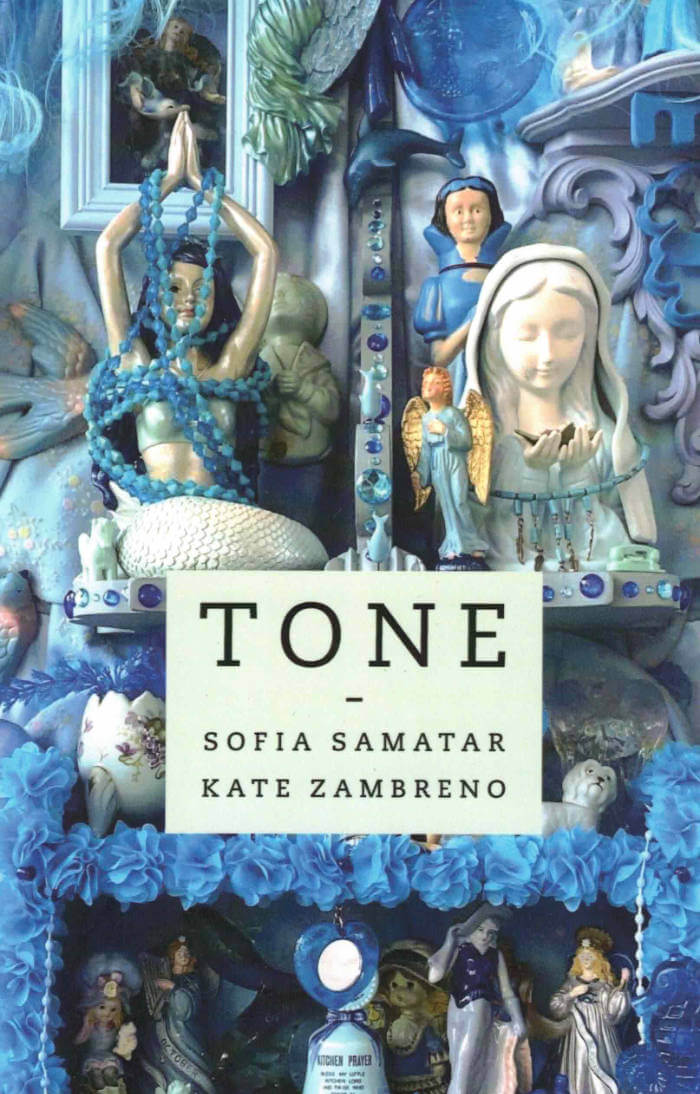
Tone
Tone is a collaborative study of literary tone, exploring its implications for community, politics, and ecology.
Both granular and global, infusing a text with feeling, tone is so difficult to pin down that responses to it often take the vague form of "I know it when I see it." In Tone, a cooperative authorial voice under the name of the Committee to Investigate Atmosphere begins from the premise that tone is relational, belonging to shared experience rather than a single author, and should be approached through a communal practice. In partnership, the Committee explores the atmospheres emanating from texts by Nella Larsen, W. G. Sebald, Heike Geissler, Hiroko Oyamada, Mieko Kanai, Bhanu Kapil, Franz Kafka, Renee Gladman, and others, attending to the chafing of political irritation, the hunger of precarious and temporary work, and the lonely delights of urban and suburban walks.
This study treats a variety of questions: How is tone filtered through translation? Can a text hold the feelings that pass between humans and animals? What can attention to literary tone reveal about shared spaces such as factories, universities, and streets and the clashes and connections that happen there? Searching and conversational, Tone seeks immersion in literary affect to convey the experience of reading-and living-together.

On the Inconvenience of Other People
In On the Inconvenience of Other People Lauren Berlant continues to explore our affective engagement with the world. Berlant focuses on the encounter with and the desire for the bother of other people and objects, showing that to be driven toward attachment is to desire to be inconvenienced. Drawing on a range of sources, including Last Tango in Paris, Ralph Waldo Emerson, Claudia Rankine, Christopher Isherwood, Bhanu Kapil, the Occupy movement, and resistance to anti-Black state violence, Berlant poses inconvenience as an affective relation and considers how we might loosen our attachments in ways that allow us to build new forms of life. Collecting strategies for breaking apart a world in need of disturbing, the book's experiments in thought and writing cement Berlant's status as one of the most inventive and influential thinkers of our time.
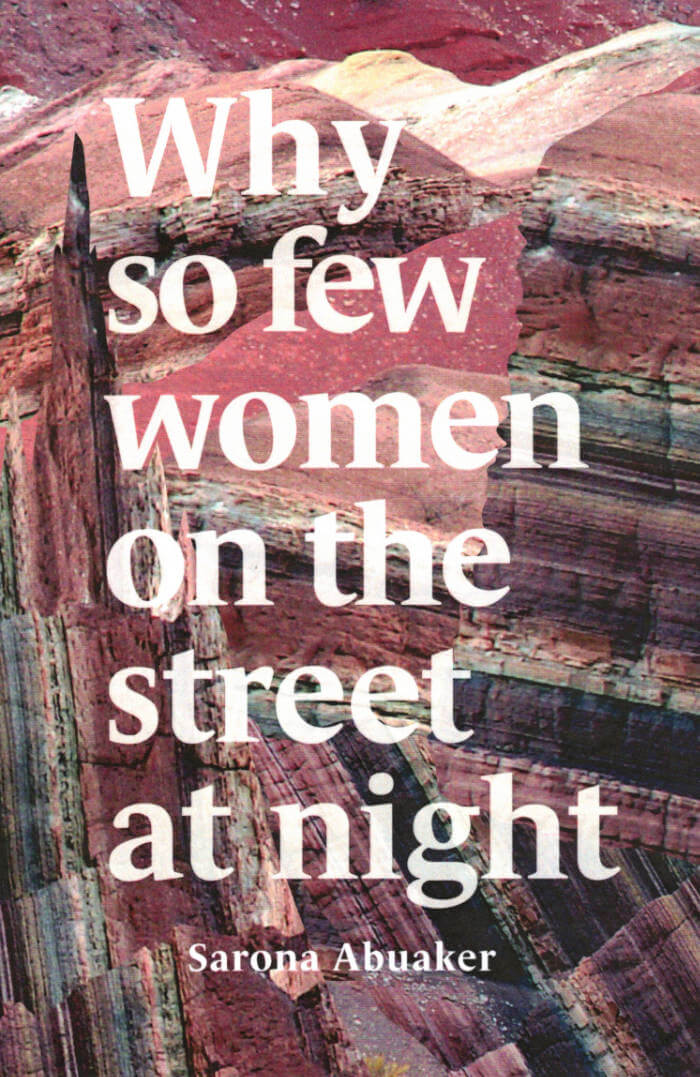
Why so few women on the street at night
In Sarona Abuaker’s extraordinary debut collection, “images, graphs, charts, statistics, maps, bank statements from the home of origin &/or showing the said home of origins” perform a version of skin that shakes until it is no longer something another person could touch. Is this erasure, a metamorphic performance, or the moment, in fact, in which the body is disappeared? In one searing instance, Abuaker attends to somatic memory as something made available only by severance, a physiological and political act: “release memory/ muscle/heart/if you cut open the chest/you will see the blockages/cross lines/coronary/green azygous/armistice/ partition/seizing seizing seizing.” Here, syntax performs the cut and becomes the texture, the wound, the very thing that must be sutured now. As the poet writes: “resistance sometimes looks like constraint.” Perhaps the same could be said of recovery (aftermath) as well. Why so few women on the street at night is another brilliant offering from the87press. – Bhanu Kapil
Sarona Abuaker is a poet, artist, and educational outreach worker. Her poems have been published in Berfrois, MAP Magazine, and the87press’ Digital Poetics series. Her mixed-media essay Suture Fragmentations – A Note on Return was published in December 2020 with KOHL: A Journal for Body and Gender Research. She is based in London. Why so few women on the street at night is her debut collection (the87press, 2021).

I'll Drown My Book: Conceptual Writing by Women
Vanessa Place, Teresa Carmody and 2 more
Conceptual writing is emerging as a vital 21st century literary movement and I’ll Drown My Book represents the contributions of women in this defining moment. Edited by Caroline Bergvall, Laynie Browne, Teresa Carmody and Vanessa Place, I’ll Drown My Book takes its name from a poem by Bernadette Mayer, appropriating Shakespeare. The book includes work by 64 women from 10 countries, with contributors’ responses to the question—What is conceptual writing?—appearing alongside their work. I’ll Drown My Book offers feminist perspectives within this literary phenomenon.
CONTRIBUTORS:
Kathy Acker, Oana Avasilichioaei & Erin Moure, Dodie Bellamy, Lee Ann Brown, Angela Carr, Monica de la Torre, Danielle Dutton, Renee Gladman, Jen Hofer, Bernadette Mayer, Sharon Mesmer, Laura Mullen, Harryette Mullen, Deborah Richards, Juliana Spahr, Cecilia Vicuña, Wendy Walker, Jen Bervin, Inger Christiansen, Marcella Durand, Katie Degentesh, Nada Gordon, Jennifer Karmin, Mette Moestrup, Yedda Morrison, Anne Portugal, Joan Retallack, Cia Rinne, Giovanni Singleton, Anne Tardos, Hannah Weiner, Christine Wertheim, Norma Cole, Debra Di Blasi, Stacy Doris & Lisa Robertson, Sarah Dowling, Bhanu Kapil, Rachel Levitsky, Laura Moriarty, Redell Olsen, Chus Pato, Julie Patton, Kristin Prevallet, a.rawlings, Ryoko Seikiguchi, Susan M. Schultz, Rosmarie Waldrop, Renee Angle, Rachel Blau DuPlessis, Theresa Hak Kyung Cha, Tina Darragh, Judith Goldman, Susan Howe, Maryrose Larkin, Tracie Morris, Sawako Nakayasu, M. NourbeSe Philip, Jena Osman, kathryn l. pringle, Frances Richard, Kim Rosenfeld, and Rachel Zolf.

The Buddhist
While ending an affair with a Buddhist teacher, Dodie Bellamy wrote about it simultaneously on her blog. This experiment in writing in extremis explores nuances of public shame, the vagaries of desire and rage, and Bellamy's confusion over the authenticity of group and individual spirituality. What is personal, what is public? In the electronic age, can anybody tell the difference?
The Buddhist celebrates marginalized subjectivity as enacted in the work of female artists from Bessie Smith to Eva Hesse and Carolee Schneeman, to Bhanu Kapil and Ariana Reines. The Allone Co. Edition contains the essence of the blog, as well as more extended narratives too explicit to post on line.
Design by Wayne Smith
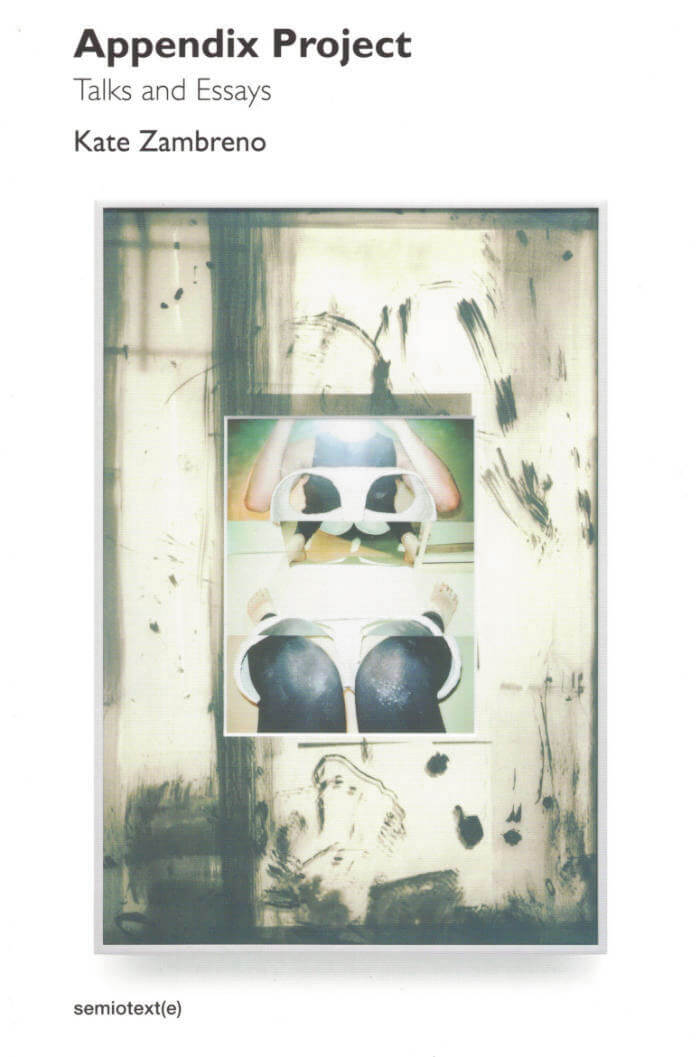
Appendix Project: Talks and Essays
Inspired by the lectures of Roland Barthes, Anne Carson, and Jorge Luis Borges, Kate Zambreno's Appendix Project collects eleven talks and essays written in the course of the year following the publication of Book of Mutter, Zambreno's book on her mother that took her over a decade to write. These surprising and moving performances, underscored by the sleeplessness of the first year of her child's life, contain Zambreno's most original and dazzling thinking and writing to date.
In Appendix Project Zambreno thinks through the work of On Kawara, Roland Barthes, W.G. Sebald, Bhanu Kapil, Walter Benjamin, Theresa Hak Kyung Cha, Marguerite Duras, Marlene Dumas, Louise Bourgeois, Doris Salcedo, Jenny Holzer, and more.
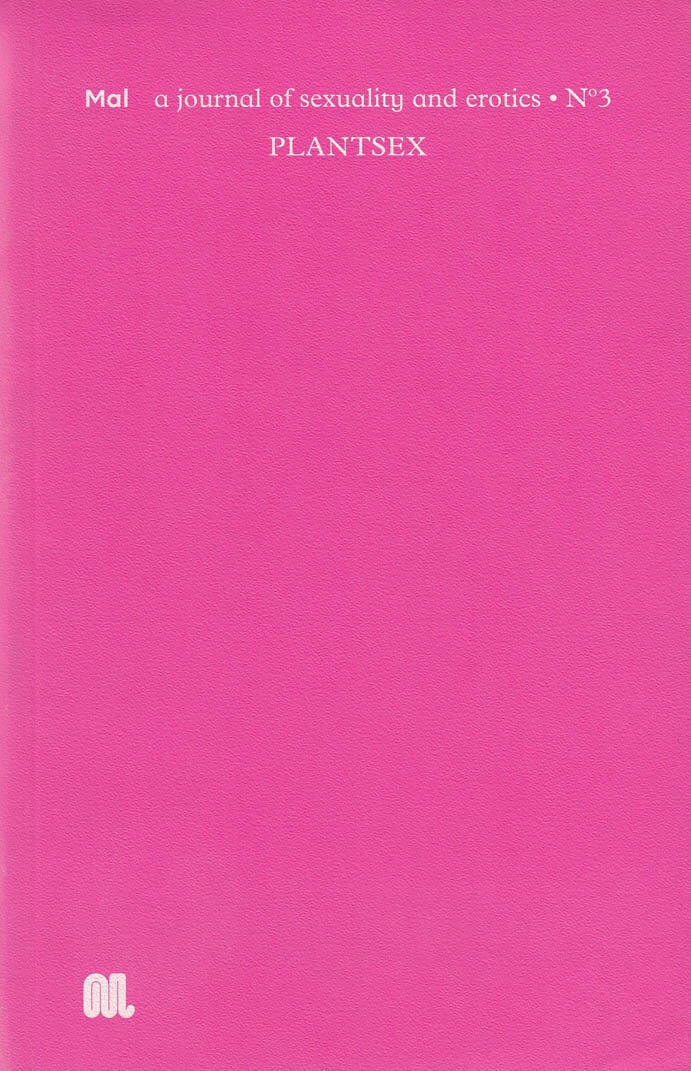
MAL, Nº 3: PLANTSEX
Kathryn Maris, Maria Dimitrova
On botany and eroticism in twelve essays, stories and poems. Published in collaboration with Serpentine Galleries.
First published: April 2019.
This issue of Mal Journal features an essay by Chloe Aridjis on Mexican flora and its foreigners, a sequence of poems by Bhanu Kapil, an essay on the sex lives of plants by Emanuele Coccia, a sci-fi story by artist Victoria Sin, a personal exploration of the queerness of gardening by Julia Bell, an essay on queer botanics by film critic Teresa Castro, a sequence of botanical nursery rhymes and artworks by artist, poet and gardener Alex Cecchetti, a new poem (and somatic poetry ritual) by CAConrad, an essay by writer and poet Daisy Lafarge asking ‘Can you be a revolutionary & still love flowers?’, excerpts from the Song of Songs and Ovid's Fasti V and Metamorphoses, and illustrations by Australian artist Yi Xiao Chen.
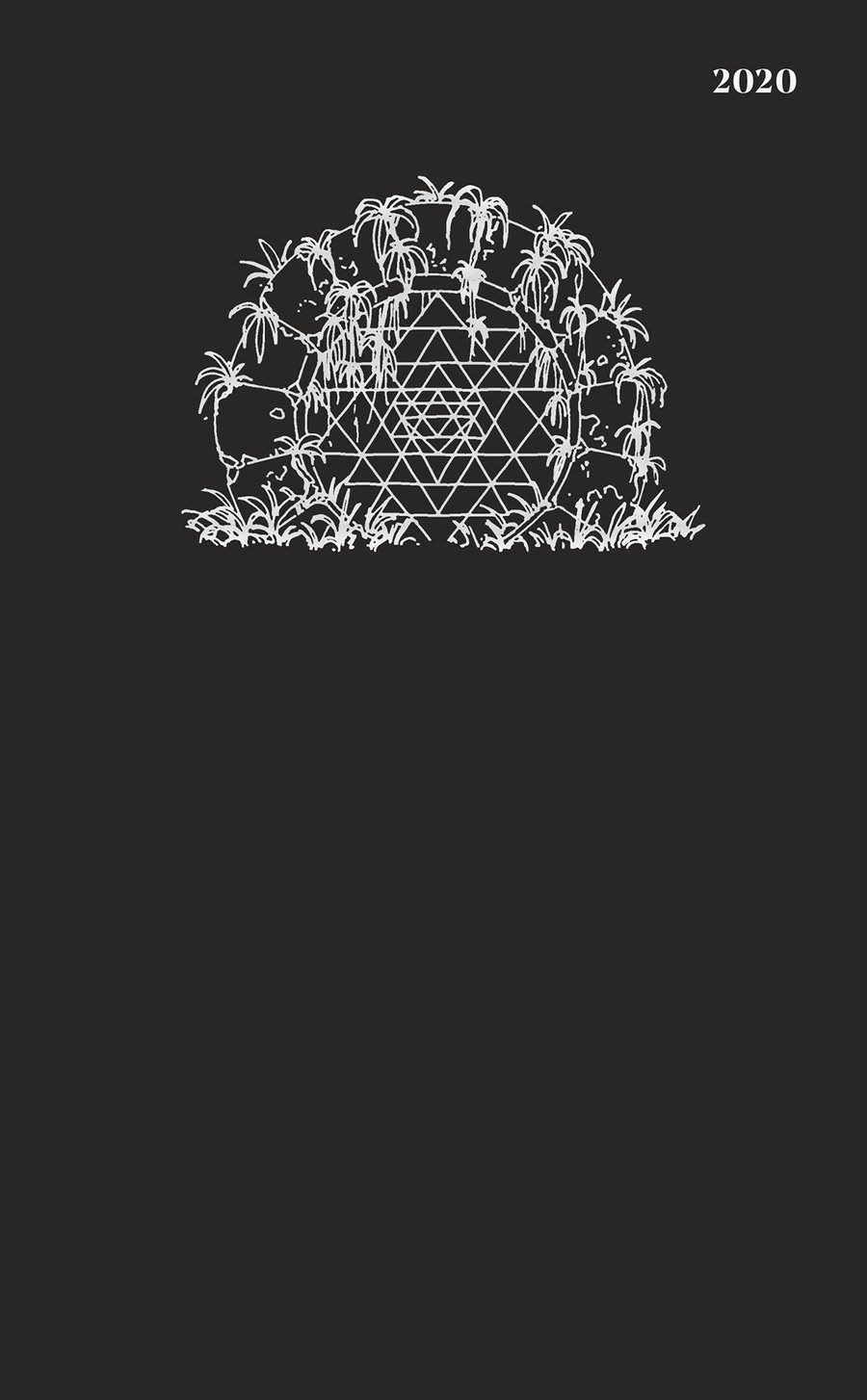
Ignota Diary 2020
The Ignota Diary is a tool for discovery in the practice of everyday life. This beautifully designed diary and week-to-view planner is filled with historically significant magical and sacred dates from around the world. Drawn from events such as the Buddha’s birthday, esoteric festivals and artistic and occult history, the diary touches on the lives of characters such as Ursula K. Le Guin, Zora Neale Hurston, Carl Jung, Simone Weil, Aleister Crowley, George Bataille, Timothy Leary, Hilma af Klint, Saint Hildegard of Bingen, William Blake and W.B. Yeats.
The diary provides full astrological navigation for 2020 with an overview of the year, a birthchart template and guides to moon magic, houses, planets and symbols. Key transits, retrogrades and lunar phases, noted throughout the planner, allow you to organise your life in alignment with the astrological weather, visible at a glance. A global map showing sacred sites provides inspiration for transformative pilgrimages.
Rituals by the acclaimed artist Jesse Darling and poets CAConrad, Bhanu Kapil and Nisha Ramayya and seasonal tarot spreads by practitioners including adrienne maree brown and Rachel Pollack, author of the bestselling tarot guide 78 Degrees of Wisdom, offer guidance and space for reflection throughout the year. Additional sources of inspiration include guides to Soji cleaning by Zen monk Shoukei Matsumoto, author of the bestseller A Monk's Guide to a Clean House and Mind, and guided meditation by Julian Vayne of the Psychedelic Museum.
To support a holistic approach to health and wellbeing, an appendix contains guides to healing herbs, key acupressure points, the chakra system and Ayurvedic medicine, as well as a directory of key magical places, shops and websites